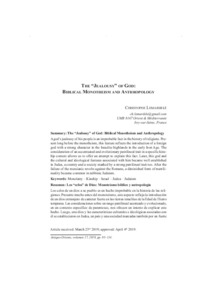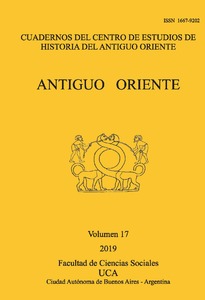Por favor, use este identificador para citar o enlazar este ítem:
https://repositorio.uca.edu.ar/handle/123456789/10304| Título: | The “jealousy” of God : biblical monotheism and anthropology Los “celos” de Dios : monoteísmo bíblico y antropología |
Autor: | Lemardelé, Christophe | Palabras clave: | HISTORIA ANTIGUA; ANTROPOLOGIA; MONOTEÍSMO; DIOS; HISTORIA DE LAS RELIGIONES; EDAD DE HIERRO; JUDAISMO; BIBLIA | Fecha de publicación: | 2019 | Editorial: | Universidad Católica Argentina. Facultad de Ciencias Sociales. Departamento de Historia. Centro de Estudios de Historia del Antiguo Oriente | Cita: | Lemardelé, C. The “jealousy” of God : biblical monotheism and anthropology. [en línea], Antiguo Oriente : Cuadernos del Centro de Estudios de Historia del Antiguo Oriente. 2019, 17. Disponible en: https://repositorio.uca.edu.ar/handle/123456789/10304 | Resumen: | Abstract: A god’s jealousy of his people is an improbable fact in the history of religions. Present
long before the monotheism, this feature reflects the introduction of a foreign
god with a strong character in the Israelite highlands in the early Iron Age. The
consideration of an accentuated and evolutionary patrilineal trait in a specific kinship
context allows us to offer an attempt to explain this fact. Later, this god and
the cultural and ideological features associated with him became well established
in Judea, a country and a society marked by a strong patrilineal trait too. After the
failure of the messianic revolts against the Romans, a diminished form of matrilineality
became common in rabbinic Judaism. Resumen: Los celos de un dios a su pueblo es un hecho improbable en la historia de las religiones. Presente mucho antes del monoteísmo, este aspecto refleja la introducción de un dios extranjero de carácter fuerte en las tierras israelitas de la Edad de Hierro temprana. Las consideraciones sobre un rasgo patrilineal acentuado y evolucionado, en un contexto específico de parentesco, nos ofrecen un intento de explicar este hecho. Luego, este dios y las características culturales e ideológicas asociadas con él se establecieron en Judea, un país y una sociedad marcadas también por un fuerte rasgo patrilineal. Luego de los fracasos de las revueltas mesiánicas contra los romanos, una forma disminuida de matrilinealidad se volvió común en el judaísmo rabínico. |
Cobertura Espacial: | Israel | URI: | https://repositorio.uca.edu.ar/handle/123456789/10304 | ISSN: | 1667-9202 | Disciplina: | HISTORIA | Derechos: | Acceso abierto | Fuente: | Antiguo Oriente: Cuadernos del Centro de Estudios de Historia del Antiguo Oriente 17, (2019) |
| Aparece en las colecciones: | AO - 2019 vol. 17 |
Ficheros en este ítem:
| Fichero | Descripción | Tamaño | Formato | |
|---|---|---|---|---|
| the-jealousy-of-god.pdf | 99,95 kB | Adobe PDF |  Visualizar/Abrir | |
| cover.jpg | 121,62 kB | JPEG |  Visualizar/Abrir |
Visualizaciones de página(s)
188
comprobado en 30-abr-2024
Descarga(s)
319
comprobado en 30-abr-2024
Google ScholarTM
Ver en Google Scholar
Este ítem está sujeto a una Licencia Creative Commons

